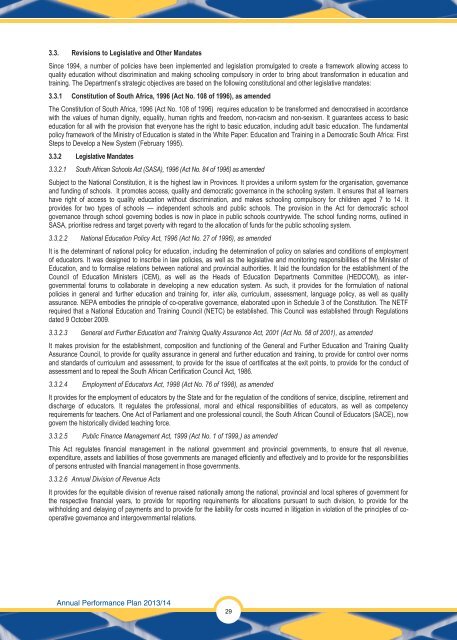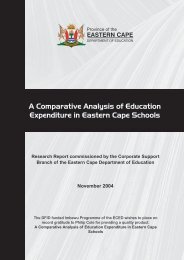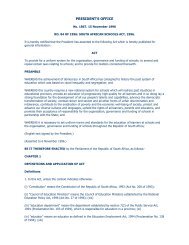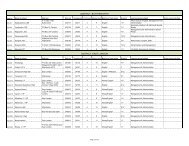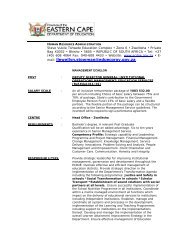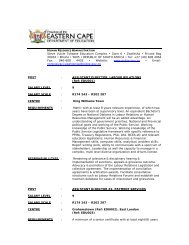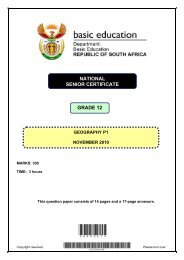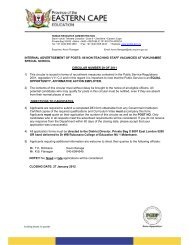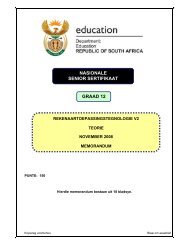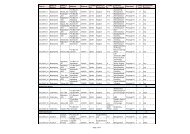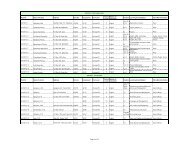Annual Performance Plan 2013/14 - Department of Education
Annual Performance Plan 2013/14 - Department of Education
Annual Performance Plan 2013/14 - Department of Education
Create successful ePaper yourself
Turn your PDF publications into a flip-book with our unique Google optimized e-Paper software.
3.3. Revisions to Legislative and Other Mandates<br />
Since 1994, a number <strong>of</strong> policies have been implemented and legislation promulgated to create a framework allowing access to<br />
quality education without discrimination and making schooling compulsory in order to bring about transformation in education and<br />
training. The <strong>Department</strong>’s strategic objectives are based on the following constitutional and other legislative mandates:<br />
3.3.1 Constitution <strong>of</strong> South Africa, 1996 (Act No. 108 <strong>of</strong> 1996), as amended<br />
The Constitution <strong>of</strong> South Africa, 1996 (Act No. 108 <strong>of</strong> 1996) requires education to be transformed and democratised in accordance<br />
with the values <strong>of</strong> human dignity, equality, human rights and freedom, non-racism and non-sexism. It guarantees access to basic<br />
education for all with the provision that everyone has the right to basic education, including adult basic education. The fundamental<br />
policy framework <strong>of</strong> the Ministry <strong>of</strong> <strong>Education</strong> is stated in the White Paper: <strong>Education</strong> and Training in a Democratic South Africa: First<br />
Steps to Develop a New System (February 1995).<br />
3.3.2 Legislative Mandates<br />
3.3.2.1 South African Schools Act (SASA), 1996 (Act No. 84 <strong>of</strong> 1996) as amended<br />
Subject to the National Constitution, it is the highest law in Provinces. It provides a uniform system for the organisation, governance<br />
and funding <strong>of</strong> schools. It promotes access, quality and democratic governance in the schooling system. It ensures that all learners<br />
have right <strong>of</strong> access to quality education without discrimination, and makes schooling compulsory for children aged 7 to <strong>14</strong>. It<br />
provides for two types <strong>of</strong> schools — independent schools and public schools. The provision in the Act for democratic school<br />
governance through school governing bodies is now in place in public schools countrywide. The school funding norms, outlined in<br />
SASA, prioritise redress and target poverty with regard to the allocation <strong>of</strong> funds for the public schooling system.<br />
3.3.2.2 National <strong>Education</strong> Policy Act, 1996 (Act No. 27 <strong>of</strong> 1996), as amended<br />
It is the determinant <strong>of</strong> national policy for education, including the determination <strong>of</strong> policy on salaries and conditions <strong>of</strong> employment<br />
<strong>of</strong> educators. It was designed to inscribe in law policies, as well as the legislative and monitoring responsibilities <strong>of</strong> the Minister <strong>of</strong><br />
<strong>Education</strong>, and to formalise relations between national and provincial authorities. It laid the foundation for the establishment <strong>of</strong> the<br />
Council <strong>of</strong> <strong>Education</strong> Ministers (CEM), as well as the Heads <strong>of</strong> <strong>Education</strong> <strong>Department</strong>s Committee (HEDCOM), as intergovernmental<br />
forums to collaborate in developing a new education system. As such, it provides for the formulation <strong>of</strong> national<br />
policies in general and further education and training for, inter alia, curriculum, assessment, language policy, as well as quality<br />
assurance. NEPA embodies the principle <strong>of</strong> co-operative governance, elaborated upon in Schedule 3 <strong>of</strong> the Constitution. The NETF<br />
required that a National <strong>Education</strong> and Training Council (NETC) be established. This Council was established through Regulations<br />
dated 9 October 2009.<br />
3.3.2.3 General and Further <strong>Education</strong> and Training Quality Assurance Act, 2001 (Act No. 58 <strong>of</strong> 2001), as amended<br />
It makes provision for the establishment, composition and functioning <strong>of</strong> the General and Further <strong>Education</strong> and Training Quality<br />
Assurance Council, to provide for quality assurance in general and further education and training, to provide for control over norms<br />
and standards <strong>of</strong> curriculum and assessment, to provide for the issue <strong>of</strong> certificates at the exit points, to provide for the conduct <strong>of</strong><br />
assessment and to repeal the South African Certification Council Act, 1986.<br />
3.3.2.4 Employment <strong>of</strong> Educators Act, 1998 (Act No. 76 <strong>of</strong> 1998), as amended<br />
It provides for the employment <strong>of</strong> educators by the State and for the regulation <strong>of</strong> the conditions <strong>of</strong> service, discipline, retirement and<br />
discharge <strong>of</strong> educators. It regulates the pr<strong>of</strong>essional, moral and ethical responsibilities <strong>of</strong> educators, as well as competency<br />
requirements for teachers. One Act <strong>of</strong> Parliament and one pr<strong>of</strong>essional council, the South African Council <strong>of</strong> Educators (SACE), now<br />
govern the historically divided teaching force.<br />
3.3.2.5 Public Finance Management Act, 1999 (Act No. 1 <strong>of</strong> 1999,) as amended<br />
This Act regulates financial management in the national government and provincial governments, to ensure that all revenue,<br />
expenditure, assets and liabilities <strong>of</strong> those governments are managed efficiently and effectively and to provide for the responsibilities<br />
<strong>of</strong> persons entrusted with financial management in those governments.<br />
3.3.2.6 <strong>Annual</strong> Division <strong>of</strong> Revenue Acts<br />
It provides for the equitable division <strong>of</strong> revenue raised nationally among the national, provincial and local spheres <strong>of</strong> government for<br />
the respective financial years, to provide for reporting requirements for allocations pursuant to such division, to provide for the<br />
withholding and delaying <strong>of</strong> payments and to provide for the liability for costs incurred in litigation in violation <strong>of</strong> the principles <strong>of</strong> cooperative<br />
governance and intergovernmental relations.<br />
<strong>Annual</strong> <strong>Performance</strong> <strong>Plan</strong> <strong>2013</strong>/<strong>14</strong><br />
29


